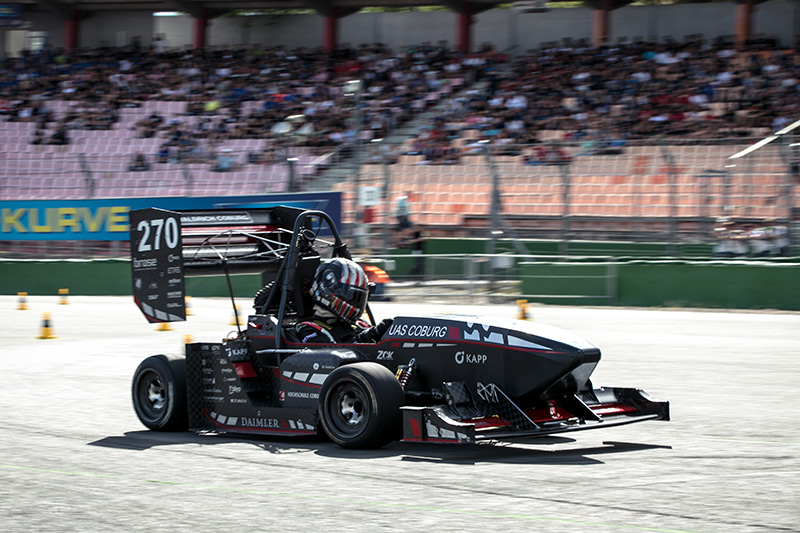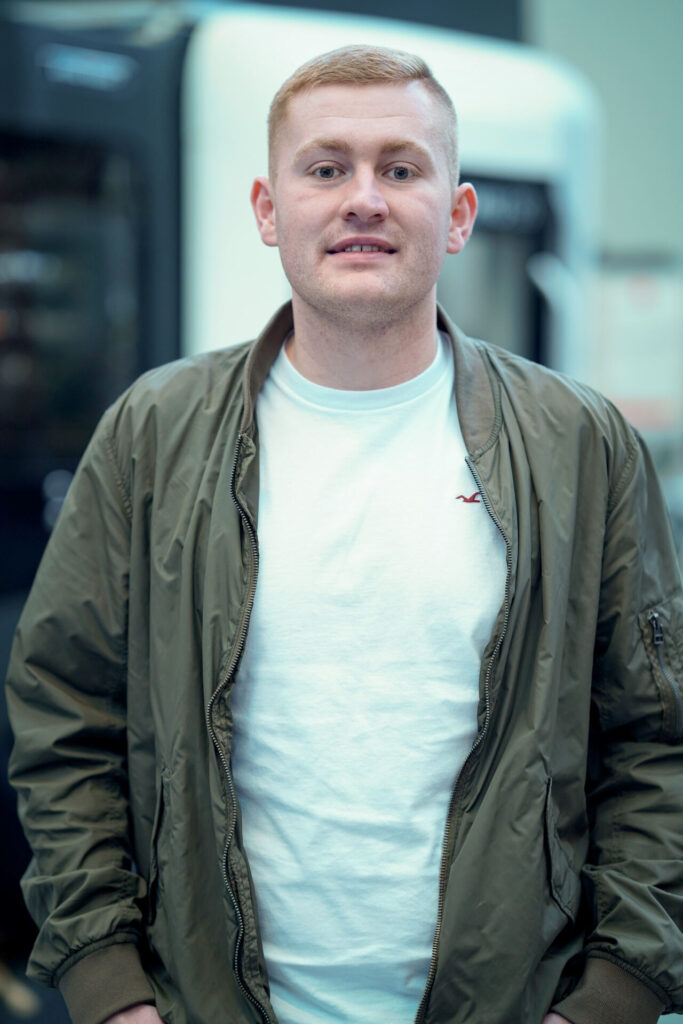Mechanical engineering – digital development and simulation
At a glance
Academic degree
Bachelor of Engineering (B.Eng.)
Form of study
Full-time
Standard period of study
7 semesters (incl. practical semester), 210 ECTS
Place of study
Language of instruction
German
Start of studies
Winter and summer semester (October 01 and March 15 respectively)
Admission requirements
University entrance qualification, entrance qualification for universities of applied sciences, vocational qualification or foreign educational certificate
Orientation semester
Individual modules can be taken as part of an orientation semester
Semester abroad
Possible as a theoretical or practical semester
Studying with a practice partner
Possible as a combined study program (PraxisPlus) or study program with in-depth practical experience (PraxisPlus)
Accreditation
accredited by ACQUIN
Registration
02.05. – 30.09. (winter semester)
15.11. – 14.03. (summer semester)
Profile of the degree program
What we value
Strong practical and project orientation
The course is strongly practice- and project-oriented and thus specifically geared towards the requirements of professional practice. You will work on systems and machines from the very first semester and work on several projects alone or in teams during the course of your studies.
In addition, you will complete several internships in modern laboratories and workshops alongside your lectures. There are also specific projects with partners from industry, which create valuable contacts for starting your career. The strong practical and project focus of the degree program promotes your skills in project and process management as well as your teamwork and communication skills, thus optimally preparing you for the demands of the modern working world.
Study internationally
Coburg University of applied sciences arts maintains relationships with numerous foreign partner universities. This gives you the opportunity to spend a study or internship semester abroad. Further information can be found at: Study abroad
Course content
1st study section (basics)
In the “Digital Development and Simulation” branch of the “Mechanical Engineering” degree program, you will learn the following basics in the first three theoretical semesters:
- Design and machine elements
- CAx and design systems
- Mathematics
- Mechanics
- Computer science and programming
- Project management
- Business administration
2nd study stage (specialization)
The second stage of your studies begins in the fourth semester. You can either complete your internship semester straight away or wait until the sixth semester. This allows you to design your course of study individually. You can also complete your internship semester abroad.
In the two theoretical semesters of the second study section (e.g. 4th and 5th semester or 5th and 6th semester) are about deepening your knowledge.
Contents are for example:
- Simulation methods
- Specialization in design and machine elements
- Fluid mechanics and heat transfer
- Control and regulation technology
- Digitalization of the value chain
- Materials technology
By choosing various compulsory elective modules , you can further shape your studies to a large extent according to your wishes. You can choose from the following subjects, for example:
- Free-form surface modeling
- In-depth study of finite element analysis
- Plastic-compatible modeling
- Applied design theory
The Bachelor’s thesis can be written on site or in industry and is integrated into the 7th semester.
Practice during studies
Basic internship
Before the start of the practical semester, i.e. before your studies or during the first semester break, you will complete a 6-week basic internship in a company and gain your first practical insights into mechanical engineering. The basic internship can be waived in full or in part upon application, for example if you have a degree from a technical college or relevant vocational training. You can find more information in our information sheet on the basic internship. If you have any questions, please contact the relevant internship officer.
Practical semester
You can complete the practical semester in either the fourth or sixth semester. It comprises a continuous period of 20 weeks in a company. Here you can put your skills to the test in industry on an interesting project and make valuable contacts for your career.
You will also attend practical courses.
PRACTICE PLUS
Studying with in-depth practical experience (PRAXISPLUS)
A degree course with in-depth practical experience (PRAXISPLUS) offers the opportunity to gain up to 50 percent more practical experience during the course of your studies – without extending the duration of your studies. The prerequisite is a work contract with a company/institution. Students can apply their knowledge from the lecture directly at work. The work at the company is remunerated. This in turn makes it easier to finance their studies.
Joint degree program (PRAXISPLUS)
In the combined study program (PRAXISPLUS), you combine the Bachelor’s degree with a suitable vocational training, for example a Bachelor’s degree in Automotive Technology with training as an automotive mechatronics technician.
This variant usually takes one year longer than the regular course of study, as you spend the first year exclusively in the training company and at the vocational school; you only start studying in the second year. From then on, you will spend the lecture period at the university and the lecture-free period as well as the practical semester in your training company. After 2.5 to 3 years, you will take the final examination for your apprenticeship, but will continue to work for your practice partner. You will also agree the topic of your Bachelor’s thesis with them. After 4.5 to 5 years, you will have a vocational training qualification and a Bachelor’s degree.
CAT-Racing

CAT-Racing
Students at the university design their own racing car to compete against teams from other universities in the “Formula Student” competition on international race tracks.
CAT-Racing always achieves top placings. You too can become part of the team, prepare for your future career and, above all, have a lot of fun. Further information at www.cat-racing.de
Job & Career
Mechanical engineering is a leading industry in Germany, and engineering knowledge is in demand worldwide.
With a degree in “Digital Development and Simulation”, you will be an expert in the entire product creation process – from digital planning to development. You will not only develop customer-specific machines and components, but also modular machines with adaptable software and innovative business models. You can use your skills in development offices, medium-sized companies and large-scale industry – whether in the automotive sector, mechanical engineering or engineering offices. You will also be ideally prepared to manage interdisciplinary projects and find creative solutions to complex challenges.
Do another master's degree!
After successfully completing their Bachelor’s degree, good graduates have the opportunity to gain further qualifications with a Master’s degree. Coburg University of applied sciences and arts offers Master’s degree courses in Autonomous Driving, Additive Manufacturing & Lightweight Design and Development and Management in Mechanical and Automotive Engineering as well as other technical degree courses.
You can also find an overview of which Master’s degree courses you can combine with your Bachelor’s degree here.
Insights
You are currently viewing a placeholder content from YouTube. To access the actual content, click the button below. Please note that doing so will share data with third-party providers.
More InformationCurriculum and examination regulations
The module plan provides an overview of the structure of the degree program.
The module handbook provides information on the content of the individual modules. The study and examination regulations form the legal basis of the degree program. Questions about the content of the degree course will be answered by the course director Prof. Dr. Ingo Faber.
Study Ambassador

I’m Gabriel Folger and I’m a student ambassador for the Mechanical Engineering degree program. I study at Coburg University of applied sciences and arts myself and can answer your questions directly. So if you want to know what the degree program is all about or what it’s like to live in Coburg, just send me an email at gabriel.folger@stud.hs-coburg.de.



